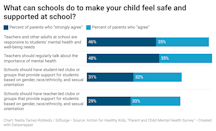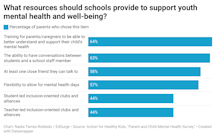What do parents want from schools when it comes to support for their children’s mental health?
Mainly, it’s to feel safe.
That’s according to the most recent data from Action for Healthy Kids, a nonprofit that promotes physical and mental well-being for school-aged children. The report results come from a survey of about 1,000 parents with children in K-12 schools in December 2023.
Parents’ concerns about their kids’ mental health ranged from worries about stress — “The pressure that is put on kids to do well on tests is overwhelming sometimes,” one parent wrote — to fears about their children experiencing racism at school.
The goal of collecting data on parental views of mental health is to give them what they want, says Rob Bisceglie, the organization’s executive officer and president. According to the survey responses, that means training and tools on how to talk to their children about issues that affect their well-being. Action for Healthy Kids is using the survey data to develop guides for parents on topics like overall mental health, racism, body positivity, setting body boundaries and suicide prevention.
“Our program is what you call a family-school partnership model, and so what the family thinks — parents and caregivers — that’s of particular importance and interest to us,” Bisceglie says.

Strong Support for Services
Parents who were surveyed by and large agreed that having a school where their child feels a sense of belonging is important to supporting students’ mental health. They also wanted mental health services to be available at school.
Nearly 70 percent of parents say their child has “at least one adult at school that they trust or talk to.” Another 88 percent of parents said a welcoming classroom environment would help their child in particular feel safe and supported. Nearly the same percentage wanted teachers to try their best to create positive relationships between students.
Despite recent politicization of K-12 schools, a majority of parents said they want schools to include lessons about topics including “respect, cooperation, perseverance, empathy.”
“I don’t think this is surprising, but [the report] reinforced something for me, that what parents really want for their kids in schools is that their kids are safe and feel a sense of love and belonging,” Bisceglie says. “We would love that nurturing relationship to be with a parent or a primary caregiver. The second most likely person to provide that kind of nurturing support for a child is in the school, and that’s why this is so important.”

Feeling ‘Fine’
The barrier to accessing mental health services that parents cited most often was their child feeling that nothing is wrong despite a parent feeling otherwise — 38 percent of parents said this was a problem.
Anais Murphy is senior manager of Action for Healthy Kids’ Youth Mental Health and Social and Emotional Learning Program. She says that while parents might worry that kids are saying they feel fine when they don’t, it’s also important for parents to know which behaviors are normal for each age group.
“I think part of the goal of this campaign is to provide parents with the information they need to understand what ‘fine’ means,” Murphy explains. “We’re certainly not trying to over-diagnose or to bring alarm bells that are not appropriate, but we absolutely do want parents to have an understanding of, what are the typical markers of development and mental health? A 14-year-old is really irritable. That’s totally appropriate and sometimes a cause for concern, but sometimes exactly where they’re supposed to be.”
The numbers also point to the fact that parents are paying more attention to youth mental health, Murphy says, and the organization wants to help parents learn where they can go for more help.
“We’re in a phase of the reduction of stigma — I’m talking about mental health — at least among the younger generation,” she says. “I think that’s a big part of it. It’s not something necessarily that came through in terms of this survey, but certainly something that’s [confirmed] in other research.”
Racism at School
In addition to mental health concerns, 58 parents of Black parents and 45 parents of Hispanic parents are worried about their child experiencing racism at school.
Bisceglie says it’s the first year the survey has asked parents about concerns over racism.
Murphy says one of the tools the organization is working on as a result of the survey is a guide for how parents can talk to their children about racism at home and how teachers can do the same at school.
“I think one of the things that happened around the pandemic time and George Floyd was we started talking about racism and institutions like schools a lot more,” she says. “Not that people were not experiencing that before, but we weren’t necessarily bringing attention to it. So it didn’t really surprise me, because schools are privy to the same kind of institutional forces that all of our other institutions are, and structural racism and institutional racism are one of those. I think it’s really important that it’s raised the level of collective consciousness so that we can start talking about it.”
- SEO Powered Content & PR Distribution. Get Amplified Today.
- PlatoData.Network Vertical Generative Ai. Empower Yourself. Access Here.
- PlatoAiStream. Web3 Intelligence. Knowledge Amplified. Access Here.
- PlatoESG. Carbon, CleanTech, Energy, Environment, Solar, Waste Management. Access Here.
- PlatoHealth. Biotech and Clinical Trials Intelligence. Access Here.
- Source: https://www.edsurge.com/news/2024-06-10-kids-say-they-re-fine-but-parents-worry-about-enough-mental-health-support



